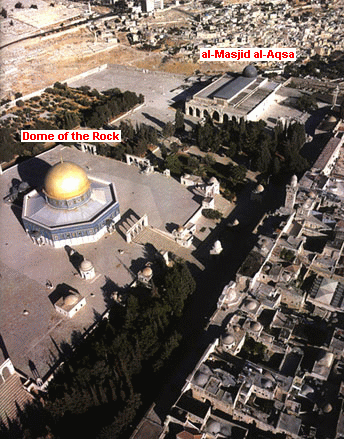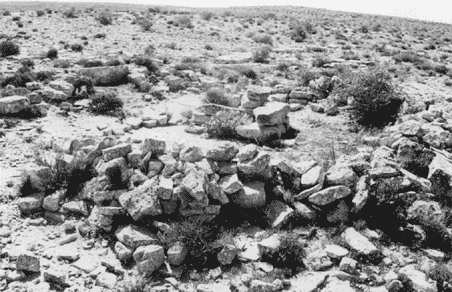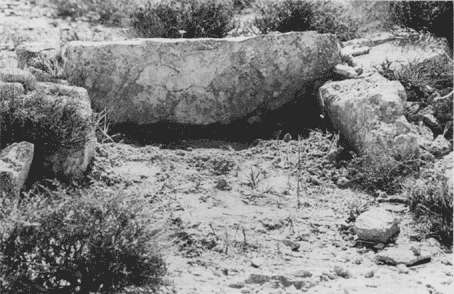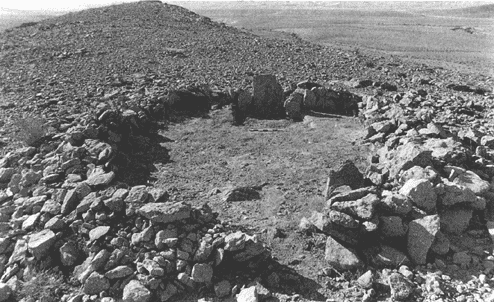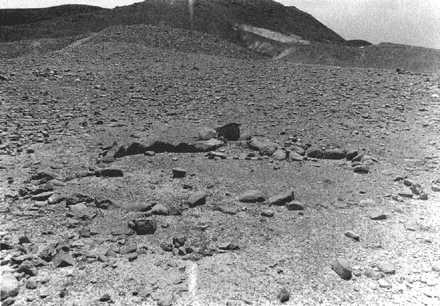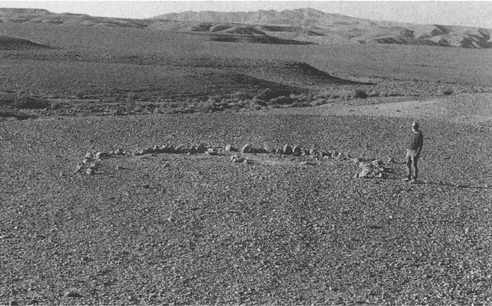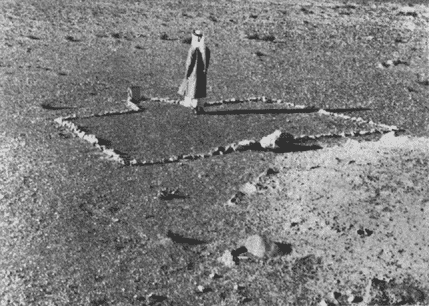I wasn't going to touch this with a 10-foot pole because I have a major test to study for, but I had to reply. *sigh* Maybe this will be my only post on this thread?
Glory to (Allah) Who did take His Servant for a Journey by night
from the Sacred Mosque to the Farthest Mosque,
whose precincts We did bless,
- in order that We might show him some of Our Signs:
for He is the One Who heareth and seeth (all things). [Qur'an 17:1]
Figure 1: An aerial view of Haram al-Sharif
Many Christian missionaries point to
an alleged difficulty concerning the above passage. They claim that :
The Farthest Mosque (Al-Masjid-ul-Aqs-a) was built many years after the death of Muhammad. It is utterly impossible that Muhammad visited it on his Night Journey.
They further add :
The Temple of Solomon had been completely destroyed in 70 AD, i.e. 550 years before the alleged time of the Miraj in 622 AD, the twelfth year of Muhammad's mission. A Temple that didn't exist anymore does not provide any better solution to this problem than a Mosque which wasn't built yet.
Similarly, the Christian apologist `Abdallah `Abd al-Fadi says:
Moreover, the Further [sic!] Mosque was not in existence at the time of Muhammad, but was built about a hundred years after his death! How could he have prayed in it, then, or described its gates and windows?[1]
Firstly, al-Aqsa mosque was built not "about a hundred years" after the death of the Prophet in 11 AH / 632 CE. In 49-50 AH / 670 CE, Bishop Arculfus, a Christian visitor in Jerusalem, reported:
On the famous place where once stood the temple, the Saracens worship at a square house of prayer, which they have built with little art, of boards and large beams on the remains of some ruins...[2]
By the time Bishop Arculfus was in Jerusalem, some 40 years after the death of Prophet Muhammad, the al-Aqsa mosque was already being used as a place of worship by Muslims. Secondly, as usual, the solution to such a "difficulty" lies in part in an elementary knowledge of the Arabic language as well as an understanding of basic Islamic concepts relating to the word "masjid".
2. What Is A Masjid?
We will begin by dealing with the word
masjid from both the linguistic and legal points of view. The Arabic word for "mosque" is
masjid. Discussing with the word
masjid from a linguistic point of view al-Zarkashi says:
Masjid from a linguistic point of view
Linguistically, it comes on the scheme of maf`il with a kasrah [i.e. the 'i' of masjid] which is ism makan [i.e., name of location] for prostration, while with a fathah [i.e., masjad] it is a masdar.
Abu Zakariyya al-Farra' [a famous grammarian] said: Every verb coming on the scheme of fa`ala [in the past form] yaf`ulu [in the present form] like dakhala yadkhulu [which means "to enter"] admits the form maf`al with a fathah as a noun or masdar without distinction like in dakhala madkhalan. There are some nouns that were bound to take a kasrah on the second letter of its root like masjid, matli`, maghrib, mashriq and others, thus making the kasrah a sign of the noun, and some Arabs may say it with a fathah.
Indeed, masjid and masjad, and matli` and matla` were all narrated.
He said: Putting a fathah in all these forms is admissible even if we did not hear it before.
He said in Al-Sihah: Masjad with a fathah refers to one's forehead which is the place involved in prostration.[3]
The Arab grammarians classify
masjid as "
ism makan", i.e., "name of location"; it indicates the place where an action takes place.
Masjid being derived from the root
sa-ja-da (to prostrate), it means "place of prostration". Since a place of worship is a place where believers prostrate to God, "
masjid" is a general term to designate any place of worship without any religious distinction. Later, this word was used to designate Islamic places of worship in particular, i.e., the mosques.
The Prophet's night journey was from "the inviolable place of worship" (
al-Masjid al-Haram) to "the farthest place of worship" (
al-Masjid al-Aqsa). The former is certainly located in Makkah, but what about the latter? The reference to Allah blessing its surroundings
(... whose precincts We did bless) suggests a location in the "Holy Land" (
cf. 21:81; 7:137; 34:18). Neal Robinson states:
The [Muslim] tradition which identifies it [i.e., al-Masjid al-Aqsa] with the Temple Mount in Jerusalem makes admirable sense in view of the fact that the 'place of worship' (masjid) whose destruction is evoked in v. 7 [i.e., 17:7] is clearly the Temple.[4]
This view is also shared by many western scholars.[5]
As it was mentioned earlier that
masjid refers to a place of prostration without any religious distinction; an excellent example of the usage of
the word "masjid" referring to a non-Islamic sanctuary can be seen in the verse 17:7. The verse describes briefly the destruction of the
masjid in Jerusalem (i.e., the Temple) by the enemies of Children of Israel. Allah says in the Qur'an that the destruction of the Temple in Jerusalem was a punishment was inflicted upon the Children of Israel for their tyranny and arrogance.
Now that the linguistic issues are clarified, let us now turn to the legal issues (i.e., Islamic Law) concerning the word
masjid. Al-Zarkashi says:
Masjid from a legal point of view
From a legal point of view it refers to every place on earth since the Prophet - peace be upon him - said: "The earth was made a masjid for me" which is a particularity of this ummah. This was said by the Qadi `Iyad because the previous nations used not to pray except in the places they were sure of their pureness whereas we were allowed to perform the prayers in any place not known to be impure.[6]
Further he emphasizes:
Since prostration is the most honourable act in prayer because of the nearness of the servant to his Lord, the name of the location was derived from it. This is why we call it masjid [location of sujud / prostration] and not marka` [place of ruku` / inclination].[7]
In summary,
masjid from a linguistic point of view means a "place of prostration" without any religious distinction. From a legal point of view the word
masjid in
shari`ah constitutes every place on earth that is fit for prostration. In other words
masjid does not designate a building but only a "place of prostration"; the place may or may not have the building. In support of the argument, we quote
hadith #323 in
Sahih al-Bukhari that has already been mentioned by al-Zarkashi:
Muhammad Ibn Sinan, i.e., al-`Awqi told us, Hushaym told us; and Sa`id Ibn an-Nadr told me, Hushaym informed us that Sayyar informed us, Yazid, i.e., Ibn Suhayb al-Faqir told us, Jabir Ibn `Abd Allah told us:
The Prophet, peace be upon him, said, "I have been given five things which were not given to any amongst the Prophets before me. These are:
1. Allah made me victorious by awe [by His frightening of my enemies] for a distance of one month's journey.
2. The earth has been made for me [and for my followers] a "masjid" [Arabic: a place for prostration]and a means of purification. Therefore, my followers can pray wherever the time of a prayer is due.
3. The booty has been made halal [lawful] for me [and was not made so for anyone else].
4. Every Prophet used to be sent to his nation exclusively but I have been sent to all mankind.
5. I have been given the right of intercession [on the Day of Resurrection].[8]
So, according to this
hadith, any place on the earth is a
masjid for Muslims. Therefore, whether there was a building or not when the Prophet made his heavenly trip, it is the location of the "Farthest Mosque" that is intended by the verse and not a building
per se because the location where it lies was blessed by God as mentioned in verse 17:1 "the Farthest Mosque, whose precincts We did bless". Therefore, no one can claim that the word "
masjid" in the Islamic terminology refers necessarily to a building. Imam Ibn
Hajar confirms this opinion in
Fath al-Bari (his commentary on
Sahih al-Bukhari) :
(the earth has been made for me a "masjid")
means a place for prostration, i.e., prostration is not restricted to any particular place of the earth. It may also be a metaphor of a construction built for prayer. This is due to the fact that once prayer is authorized everywhere on earth it becomes like a mosque for that purpose. Ibn al-Tin said: "The earth has been made for me a masjid and a means of purification" both were given to the Prophet, peace be upon him, while it was only a place for worship for others and was not a means of purification, because Jesus used to walk around and pray whenever prayer was due. Al-Dawudi said likewise before him. It was also said that they [the previous generations] were authorized to perform prayer in places known for sure to be pure, whereas this ummah is authorized to pray anywhere on earth except in the places known for sure to be impure. The strongest opinion is that of al-Khattabi who says that earlier nations were authorized to perform prayer in special places like synagogues and churches. This is confirmed by the wording of the narration of Ibn Shu`ayb "And before me people prayed in their churches." This is a controversial[?] wording but the specificity was established [??]. This is supported by the narration of al-Bazzar from the hadith of Ibn `Abbas similar to the present hadith which includes "Prophets did not pray until they reached their chamber".[9]
Before we close this issue, one should realize that verse 17:1 also speaks of "The Sacred Mosque" which is in Makkah around the Ka`bah. Did a building for the mosque exist there in the time of the Prophet? The answer is that the Ka`bah was there but there was no building for the mosque. This further adds to the argument that the word
masjid in this verse refers to a place of performing the prostration and does not imply the presence of a "building" in the modern understanding.
The above understanding of the word
masjid as a place of worship not building
per se is also well supported by archaeological and historic evidence. Below we present a picture of an early mosque in a place called Besor in Occupied Palestine.[10]
Figure 2: Besor masjid
Figure 3: Besor mosque, The Qiblah
Moshe Sharon comments about the Besor mosque. He says:
To the west of the village on the top of the hill, overlooking the valley and the houses of the village, was the threshing floor, and to the south of it a small open mosque with a rectangular mihrab made of 3 blocks of stones [bottom figure]. The mosque was built to a height of probably two layers of stones, no more than 0.5 m., and was almost square, about 3 x 3 m. and could contain no more than 8-10 men at a time.[11]






